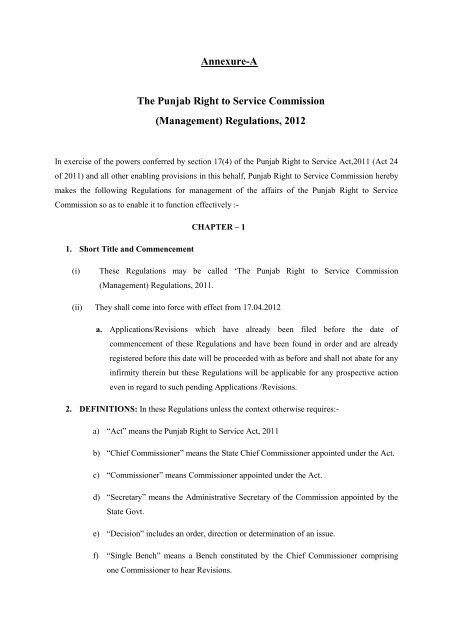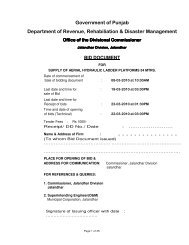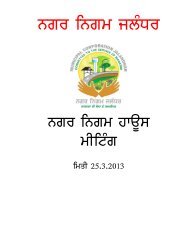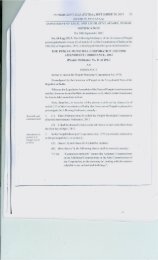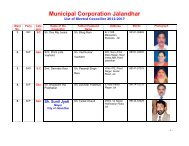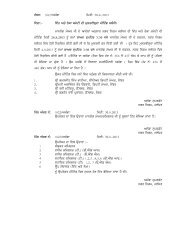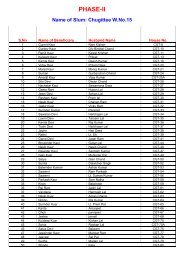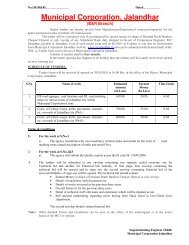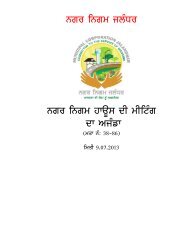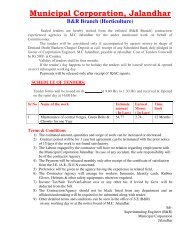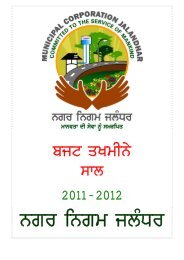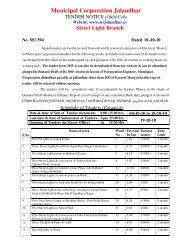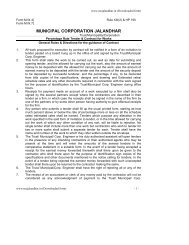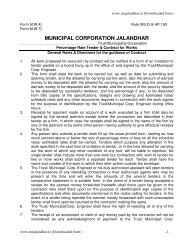The Punjab Right to Service Commission
The Punjab Right to Service Commission
The Punjab Right to Service Commission
You also want an ePaper? Increase the reach of your titles
YUMPU automatically turns print PDFs into web optimized ePapers that Google loves.
Annexure-A<strong>The</strong> <strong>Punjab</strong> <strong>Right</strong> <strong>to</strong> <strong>Service</strong> <strong>Commission</strong>(Management) Regulations, 2012In exercise of the powers conferred by section 17(4) of the <strong>Punjab</strong> <strong>Right</strong> <strong>to</strong> <strong>Service</strong> Act,2011 (Act 24of 2011) and all other enabling provisions in this behalf, <strong>Punjab</strong> <strong>Right</strong> <strong>to</strong> <strong>Service</strong> <strong>Commission</strong> herebymakes the following Regulations for management of the affairs of the <strong>Punjab</strong> <strong>Right</strong> <strong>to</strong> <strong>Service</strong><strong>Commission</strong> so as <strong>to</strong> enable it <strong>to</strong> function effectively :-CHAPTER – 11. Short Title and Commencement(i)<strong>The</strong>se Regulations may be called „<strong>The</strong> <strong>Punjab</strong> <strong>Right</strong> <strong>to</strong> <strong>Service</strong> <strong>Commission</strong>(Management) Regulations, 2011.(ii) <strong>The</strong>y shall come in<strong>to</strong> force with effect from 17.04.2012a. Applications/Revisions which have already been filed before the date ofcommencement of these Regulations and have been found in order and are alreadyregistered before this date will be proceeded with as before and shall not abate for anyinfirmity therein but these Regulations will be applicable for any prospective actioneven in regard <strong>to</strong> such pending Applications /Revisions.2. DEFINITIONS: In these Regulations unless the context otherwise requires:-a) “Act” means the <strong>Punjab</strong> <strong>Right</strong> <strong>to</strong> <strong>Service</strong> Act, 2011b) “Chief <strong>Commission</strong>er” means the State Chief <strong>Commission</strong>er appointed under the Act.c) “<strong>Commission</strong>er” means <strong>Commission</strong>er appointed under the Act.d) “Secretary” means the Administrative Secretary of the <strong>Commission</strong> appointed by theState Govt.e) “Decision” includes an order, direction or determination of an issue.f) “Single Bench” means a Bench constituted by the Chief <strong>Commission</strong>er comprisingone <strong>Commission</strong>er <strong>to</strong> hear Revisions.
g) “Division Bench” means a Bench constituted by the Chief <strong>Commission</strong>er comprisingtwo <strong>Commission</strong>ers sitting <strong>to</strong>gether <strong>to</strong> hear Revisions.h) “Full Bench” means a Bench constituted by the Chief <strong>Commission</strong>er comprising morethan two <strong>Commission</strong>ers sitting <strong>to</strong>gether <strong>to</strong> hear Revisions.i) “Record” mean the aggregate of papers relating <strong>to</strong> Revisionsj) “Registry” means a Branch of the <strong>Commission</strong> dealing with Revisions.k) “Regulation” means Regulation framed herein.l) “Representative” means a person duly authorized by or on behalf of any of the parties<strong>to</strong> the proceedings.m) “Respondent” includes an intervener or a third party or a party impleaded by the<strong>Commission</strong>.n) “Rules” mean the Rules framed by the State Government under Section 21(1) of theAct.o) “Public Information Officer” means the Officer nominated by the <strong>Commission</strong> <strong>to</strong>work as Public Information Officer under the <strong>Right</strong> <strong>to</strong> Information Act, 2005.p) “Assistant Public Information Officer” means the Officer nominated by the<strong>Commission</strong> <strong>to</strong> work as Assistant Public Information Officer under the <strong>Right</strong> <strong>to</strong>Information Act, 2005.q) “Appellate Authority” means the officer nominated by the <strong>Commission</strong> <strong>to</strong> hearappeals against the orders of Public Information Officer of the <strong>Commission</strong>.r) Words and expressions used herein but not defined shall have the same meaning asdefined in the Act.CHAPTER – II :3 Meetings of the <strong>Commission</strong> :-I. <strong>The</strong> <strong>Commission</strong> shall meet <strong>to</strong> consider and decide the matters related <strong>to</strong> thetransactions of business of the <strong>Commission</strong> ordinarily once in 2 months at such date,time and place as may be fixed by the Chief <strong>Commission</strong>er from time <strong>to</strong> time.II.<strong>The</strong> meetings of the <strong>Commission</strong> shall be ordinarily held at the headquarter of the<strong>Commission</strong> and will be presided over by the Chief <strong>Commission</strong>er.
III.IV.All matters at a meeting of the <strong>Commission</strong> shall be decided by a majority of thevotes of the <strong>Commission</strong>ers present.Two <strong>Commission</strong>ers shall form quorum at a meeting of the commission. If there isno quorum at any meeting, the meeting shall be adjourned and in the adjournedmeeting, the business of the first meeting shall be conducted irrespective of whetherthere is quorum or not.V. Notice for meeting – At least 7 days notice in writing <strong>to</strong> call a meeting of the<strong>Commission</strong> shall be given <strong>to</strong> and copy of the agenda for such meeting shall be sent<strong>to</strong> the commissioners, either with the notice or thereafter as soon as possible.Provided that an emergency meeting of the <strong>Commission</strong> may be called at ashorter notice.VI.Matters <strong>to</strong> be decided by the <strong>Commission</strong> – <strong>The</strong> following matters will be decidedby the <strong>Commission</strong> in its meetings held under the foregoing provisions:-a) Recommendations <strong>to</strong> the Government under clauses (e) and (f) of section17(1) of the Act;b) Approval of the Annual Report under section 18(2) of the Act;c) Approval of the Budget and Annual Accounts of the <strong>Commission</strong>.d) Amendments <strong>to</strong> these regulations;e) Any other matter with the approval of the Chief <strong>Commission</strong>er;All other matters will be disposed of by the Chief <strong>Commission</strong>er, by the <strong>Commission</strong>ers orOfficers of the <strong>Commission</strong> in accordance with orders issued from time <strong>to</strong> time by the Chief<strong>Commission</strong>er for distribution of work among the <strong>Commission</strong>ers and as per delegation infavour of the Officers of the <strong>Commission</strong>.VII.Record of Minutes - <strong>The</strong> minutes of the meeting of the <strong>Commission</strong> shall berecorded in writing and signed by the Presiding Officer and shall be kept in theProceeding Book. Copy of such proceedings shall also be circulated for informationof the <strong>Commission</strong>ers as soon as possible after the meeting.
CHAPTER – III4 Officers of the <strong>Commission</strong> and their functions :I. Appointment of Registrar:- <strong>The</strong> Chief <strong>Commission</strong>er may designate one or more ofits officers in the <strong>Commission</strong> <strong>to</strong> function as Registrar(s) of the <strong>Commission</strong>.5 Powers and functions of the Registrar:-I. <strong>The</strong> Registrar shall be the Officer representing the <strong>Commission</strong> <strong>to</strong> consider Revisions.II.III.IV.Registrar shall discharge his functions under the administrative control andsuperintendence of the Chief <strong>Commission</strong>er.All records of the <strong>Commission</strong> pertaining <strong>to</strong> Revisions and legal issues shall be in thecus<strong>to</strong>dy of the Registrar or the person assigned this duty by him.<strong>The</strong> office of the Registrar may receive all revisions, applications, complaints, counterstatements, replies and other documents.V. <strong>The</strong> Registrar shall decide all questions arising out of the scrutiny of the Revisionsfiled in the Registry before these are registered.VI.VII.VIII.<strong>The</strong> Registrar shall sign the notice for date of hearing fixed by respective Bench forcommunication <strong>to</strong> both the parties.<strong>The</strong> Registrar shall communicate the decisions, orders or directions of the <strong>Commission</strong><strong>to</strong> the concerned person/persons, and all such communications signed or authenticatedby the Registrar or under his authority shall be deemed <strong>to</strong> be the communication fromthe <strong>Commission</strong>.<strong>The</strong> Registrar shall exercise all such powers and discharge all such functions as areassigned <strong>to</strong> him by these Regulations or such duties as may be assigned by the Chief<strong>Commission</strong>er from time <strong>to</strong> time.CHAPTER – IV6. Working Hours:-Subject <strong>to</strong> any order by the Chief <strong>Commission</strong>er, the office of the <strong>Commission</strong> will beopen on all working days notified by the Government of <strong>Punjab</strong>, from 9.00 AM <strong>to</strong> 5.00PM with a lunch break of half an hour from 1:30 PM <strong>to</strong> 2.00 PM.
CHAPTER – V7. Registration, Abatement or Return of Revision :-I. Revision or Complaint etc. <strong>to</strong> be in writing: Every Revision, statement, rejoinder,reply or any other document filed before the <strong>Commission</strong> shall be typed or printed orhand written neatly and legibly and the language used therein shall be formal andcivilized and should not be in any way indecent or abusive. <strong>The</strong> Revision shall bepresented in at least three sets in a paper-book form.Provided that the <strong>Commission</strong> may take notice of a revision or a complaint made <strong>to</strong> itin any other form including those sent through e-mail.II.III.Contents of Revision: <strong>The</strong> contents of the Revision shall be the same as specified inthe proforma given in the Rules as Annexed <strong>to</strong> these Regulations.Filing of Counter Statement by the Designated Officer:- After receipt of a copy ofthe revision, the Designated Officer shall file counter statement with documents, ifany, pertaining <strong>to</strong> the case. A copy of the counter statement (s) so filed shall be served<strong>to</strong> the Appellant or Complainant by the Designated Officer as the case may be underintimation <strong>to</strong> the <strong>Commission</strong>.8. Posting of Revision before the <strong>Service</strong> <strong>Commission</strong>er -I. Revision shall be heard by a Single Bench consisting of one Designated<strong>Commission</strong>er or Chief <strong>Commission</strong>er in accordance with general or special ordersissued from time <strong>to</strong> time by the Chief <strong>Commission</strong>er.II.III.<strong>The</strong> Chief <strong>Commission</strong>er may constitute a Division Bench or a full Bench if in hisopinion the matter <strong>to</strong> be considered is important enough <strong>to</strong> justify consideration bysuch Bench.Revision may be heard by a Bench either in person or through video conferencefacility. <strong>The</strong> proceedings of a Bench conducted through the video conference shall bevalid.9. Personal presence of the Appellant:I. <strong>The</strong> Appellant shall be informed of the date of hearing at least seven (7) clear daysbefore that date.
II.<strong>The</strong> Appellant may at his discretion be present in person or through his dulyauthorized representative at the time of hearing of the Revision by the <strong>Commission</strong>10 Procedure for making recommendations <strong>to</strong> the State Govt. for DepartmentalAction against any officer or employee under section 17 (1) (d) of the <strong>Punjab</strong><strong>Right</strong> <strong>to</strong> <strong>Service</strong> Act:Before making any recommendations <strong>to</strong> the State Government under Section 17 (1)(d) of the Act for departmental action against any officer or employee, the concernedperson shall be issued a notice for giving him an opportunity of being heard <strong>to</strong>explain his conduct. After hearing him, the concerned <strong>Commission</strong>er or<strong>Commission</strong>ers shall take a decision taking in <strong>to</strong> consideration the explanation givenby him.11 Communication of decisions and Orders:I. Every decision or order of the <strong>Commission</strong> or any of its Benches shall be signed anddated by the <strong>Commission</strong>er or <strong>Commission</strong>ers who have heard the Revision or havedecided the matter.II.III.Every decision/order of a Bench of <strong>Commission</strong> may either be pronounced in one ofthe sittings of the concerned Bench, or may be placed on its website and may becommunicated <strong>to</strong> the parties under authentication by the Registrar or any other Officerauthorized by the <strong>Commission</strong> in this regard.Every such decision or order, whenever pronounced by a duly constituted Bench of aSingle <strong>Commission</strong>er or by a Division Bench or by a Full Bench of <strong>Commission</strong>ers,shall be deemed <strong>to</strong> be the decision by the <strong>Commission</strong> under the Act .CHAPTER- VI12. MISCELLANEOUS:-I. Language of the <strong>Commission</strong>: - Revision or a Complaint may be filed in<strong>Punjab</strong>i/English language.II.<strong>The</strong> proceedings of the <strong>Commission</strong> may be conducted in <strong>Punjab</strong>i or in English.
III.In case of any conflict or ambiguity in these Regulations, the decision of the Chief<strong>Commission</strong>er shall be final.Sd/-17.04.2012 CHIEF COMMISSIONER


